|
|
|
| Interviews met Palestijnse jongeren |
|
|
|
|
 Razan Kutlo (links), Abdallah (midden-links), Jeries (midden-rechts) en Ala’ Wajih (rechts) Mohammed ‘Omar komt eveneens aan het woord. Razan, Abdallah, Jeries en Ala’ zijn leden van de jongerengroep van het Arabische Onderwijs Instituut in Bethlehem (Arabic Educational Institute, AEI). Dit instituut streeft naar een verbeterde communicatie tussen Palestijnse jongeren en jongeren wereldwijd. De AEI is een onderdeel van Pax Christi Wereldwijd. De interviews werden in augustus 2004 afgenomen. Mohammed ‘Omar woont in Rafah in de Gazastrook. RAZAN KUTLO 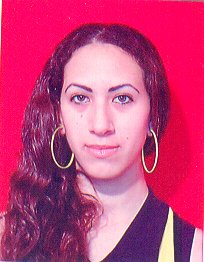 Meisje van 15 jaar uit Bethlehem.
The wall is a truly negative idea. It separates the land of Palestine and Israel into two parts. We should live in peace. For peace you don’t need this wall, which I call a separation wall. We already cannot go to Jerusalem. Now the wall makes it even more difficult. Think about the Palestinian students who cannot get their education in Jerusalem. I can’t see my friends in Jerusalem. I used to come very frequently in Jerusalem, the last time is now a year ago. I have friends who have work or who used to have work in Jerusalem. They lost it or they may lose it. No, you can’t have peace with the wall.
The wall also affects the Israelis. Since we cannot achieve peace with the wall between us, it will be bad for them them too. When they say that the wall is built to prevent bombing attacks, I respect their opinion but also tell them: not all Palestinians are terrorists.
I hope to do something against the wall, through my prayers, through marches. Next week I go to Canada and will meet also Israeli boys and girls there. Maybe I bring a piece of stone from the wall here. Not to throw at them, but to tell them the story of Palestinians.
Meisje van 15 jaar uit Bethlehem.
The wall is a truly negative idea. It separates the land of Palestine and Israel into two parts. We should live in peace. For peace you don’t need this wall, which I call a separation wall. We already cannot go to Jerusalem. Now the wall makes it even more difficult. Think about the Palestinian students who cannot get their education in Jerusalem. I can’t see my friends in Jerusalem. I used to come very frequently in Jerusalem, the last time is now a year ago. I have friends who have work or who used to have work in Jerusalem. They lost it or they may lose it. No, you can’t have peace with the wall.
The wall also affects the Israelis. Since we cannot achieve peace with the wall between us, it will be bad for them them too. When they say that the wall is built to prevent bombing attacks, I respect their opinion but also tell them: not all Palestinians are terrorists.
I hope to do something against the wall, through my prayers, through marches. Next week I go to Canada and will meet also Israeli boys and girls there. Maybe I bring a piece of stone from the wall here. Not to throw at them, but to tell them the story of Palestinians.
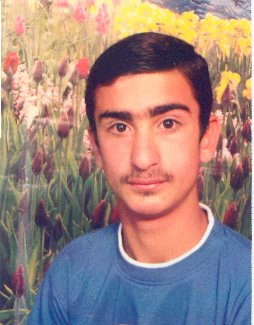 ABDALLAH KAMEL
ABDALLAH KAMELJongen van 16 jaar uit Bethlehem. I call it a racist wall because it separates Palestinians from Israelis. The wall will not bring peace between Palestinians and Israelis. When the wall will not be brought down, there will be no peace. It will just increase the Palestinian suffering. The Israelis say that the wall prevents Palestinian bombers from entering Israel. Maybe the wall will make it more difficult for them. But it will not make it impossible for them. The Palestinians will make use of many means to fight and destroy the wall such as bombing attacks in Israel, shooting at settlers. I want to tell the world that this wall is not a security wall, it will not bring security. At the moment I am not directly affected by the wall. But my family has traveling problems. My father is a teacher in Hebron south to Bethlehem. It takes him sometimes hours before he can reach his work. Normally it should take half an hour. With the wall, I think my life is going to be difficult. We will not be able to go anywhere. How does a person feel who cannot travel? It is painful. You cannot move in your own land. It is my dream that once there will be a real peace, not a fictional peace about which everyone is talking, but a real and just peace on the ground, which you feel as people. A peace which gives rights to each party. 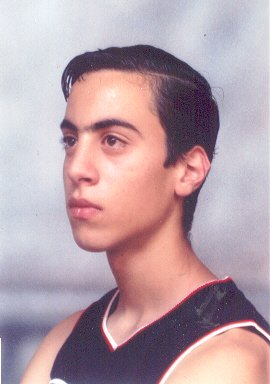 JERIES QUMSIEH
JERIES QUMSIEHJongen van zestien jaar uit Beit Sahour (oostelijk van Bethlehem). I don’t agree with the wall at all. It creates a jail from which we can’t go out without an Israeli permit. It destroys our life. Many Palestinians are unemployed, much of our land is taken. The wall is a separation wall. It separates us from all the world. Up until now my family and I here in Beit Sahour have not been affected by it directly since my father has his work and I have my school in Beit Sahour. But for sure my life will be affected by it in the future. Also, the wall prevents us from learning about the Israelis and their society and communities. It doesn’t allow us to see and meet them. You have to go abroad to meet each other. The wall is also negative in another way. It helps to keep the settlements with Israel. With all these settlements here, peace is impossible. They have taken away our lands. We cannot do many things against the wall. We can do non-violent resistance, like holding candles just beside the wall. Or talking with Israelis and giving our opinion, explaining how much this wall damages our lives. But I will not give in. I will not leave my country, land, home, whatever happens. Even if they shoot at me.  ALA’ WAJIH
ALA’ WAJIHMeisje van zestien jaar uit Beit Jala (westelijk van Bethlehem) I am from a refugee family, my family comes from a little village to the south of Jerusalem. I hope to come back once, but frankly speaking, I don’t think that that will ever happen. In a way, the wall keeps my eyes away from Israel. Already I am not very interested in Israel or in West-Jerusalem. I don’t want to go there. Only to Arab East-Jerusalem I do want to go. My problem with the wall is not that I can’t go to Israel. It is that the wall and the checkpoints divide the Palestinian land. And that we cannot travel at all. We can’t see our friends and families in Palestinian towns elsewhere. The wall is therefore a suffocation Wall. Yesterday I sat with my father in the garden. He said that the Israeli claim that the wall is for security or to stop terrorists is not true. Rather, the wall takes our land, divides us and imprisons us. The actual aims behind the wall are different from what the Israeli government is saying. Being steadfast, that is the only thing I can do. As our people say, “we will stay here always, until we die.” You shouldn’t make it easy for them to take over the country. I don’t believe that a peace is coming soon. The wall will make it harder, of course. We also have to think what “peace” means. Is a peace with closures, a wall, unemployment, a real peace? So I am against an unjust peace. About AEI 
AEI is a group of dedicated educators and students who want to inspire hope into the Palestinian community by bringing young people together for the public good and sending our Bethlehem message of peace and justice out across the world. AEI is primarily active in the Bethlehem, Hebron and Ramallah areas of Palestine. Its local groups include Moslem and Christian school students (teenagers) and older youth up into their twenties. We also work with adults involved in education, such as teachers, administrators and parents. At the international level, AEI attempts to involve into its activities interested youth from different backgrounds, religions and nationalities. AEI’s supervising board is composed of distinguished community members, including teachers and headmasters from a range of schools and lecturers at Bethlehem University. AEI works closely together with Palestinian NGOs at a local and national level, especially in the fields of education and non-violent activities. MOHAMMED ‘OMAR Het interview met Mohammed is afgenomen op 31 juli 2004 per telefoon en per e-mail. 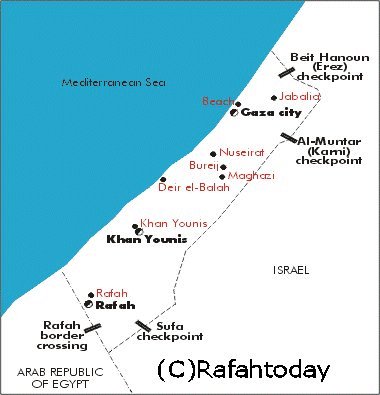 Mijn naam is Mohammed ‘Omar, ik ben 21 jaar oud. Wij komen oorspronkelijk uit Jibnah, in wat nu Israël wordt genoemd. Mijn familie is in 1948 gevlucht. Ik ben student en daarnaast ben ik journalist en fotograaf. Op mijn website:
http://www.rafah.vze.com/ vertel ik over het lot van de mensen in Rafah, in het zuiden van de Strook van Gaza.
Ik ben het niet eens met de bouw van de muur. De muur verdeelt de mensen en heeft weinig van doen met de veiligheid. Mensen vergeten vaak dat er behalve de muur op de Westelijke Jordaanoever ook een muur wordt gebouwd bij ons in Rafah, langs de grens met Egypte. Ze zeggen dat het is om de smokkel van wapens door tunnels tegen te gaan, maar tegelijkertijd vernielen ze ook honderden huizen waardoor mensen dakloos worden, ontwortelen ze bomen. En in Khan Yunis, Deir al Balah, Beit Hanoun (steden in de Strook van Gaza – red.) bouwen ze muren om de nederzettingen. In Mawaseh, een dorp aan de kust in het zuidelijkste puntje van de Strook van Gaza zitten de mensen al jaren opgesloten. Weet je wat Sharon over ons gezegd heeft? Hij zei dat hij het leven voor ons onmogelijk wil maken zodat we vanzelf zullen vertrekken.
Mijn naam is Mohammed ‘Omar, ik ben 21 jaar oud. Wij komen oorspronkelijk uit Jibnah, in wat nu Israël wordt genoemd. Mijn familie is in 1948 gevlucht. Ik ben student en daarnaast ben ik journalist en fotograaf. Op mijn website:
http://www.rafah.vze.com/ vertel ik over het lot van de mensen in Rafah, in het zuiden van de Strook van Gaza.
Ik ben het niet eens met de bouw van de muur. De muur verdeelt de mensen en heeft weinig van doen met de veiligheid. Mensen vergeten vaak dat er behalve de muur op de Westelijke Jordaanoever ook een muur wordt gebouwd bij ons in Rafah, langs de grens met Egypte. Ze zeggen dat het is om de smokkel van wapens door tunnels tegen te gaan, maar tegelijkertijd vernielen ze ook honderden huizen waardoor mensen dakloos worden, ontwortelen ze bomen. En in Khan Yunis, Deir al Balah, Beit Hanoun (steden in de Strook van Gaza – red.) bouwen ze muren om de nederzettingen. In Mawaseh, een dorp aan de kust in het zuidelijkste puntje van de Strook van Gaza zitten de mensen al jaren opgesloten. Weet je wat Sharon over ons gezegd heeft? Hij zei dat hij het leven voor ons onmogelijk wil maken zodat we vanzelf zullen vertrekken.
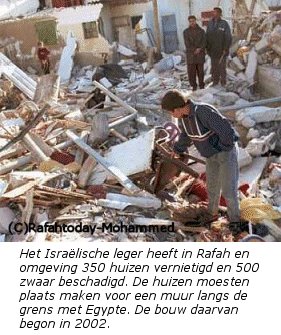 Heel Gaza zit vol met controleposten, versperringen en barrières. De soldaten daar schieten snel. Nog sneller dan op de Westbank. Ik heb op televisie gezien dat demonstranten daar op de muur graffiti aan het maken waren. Dat zou hier onmogelijk zijn weet je, ze schieten meteen op je. Ze hebben Rachel Corrie vermoord om dat ze protesteerde tegen het vernielen van huizen (Rachel Corrie was activist van de International Solidarity Movement, zie http://www.palsolidarity.org) Ze is in 2003 door een Israëlische bulldozer overreden. Ze kwam uit de VS. Het heeft veel indruk gemaakt op de mensen in Rafah.
Om Gaza heen is een hek gebouwd. Er zijn maar een paar in- en uitgangen, maar daar mogen alleen buitenlanders gebruik van maken. De meeste mensen zijn al jaren niet meer uit de strook van Gaza geweest. Ze kunnen niet naar Israël, maar ook niet naar de Westelijke Jordaanoever of naar Jeruzalem. Ikzelf ben zes jaar geleden voor het laatst in Israël geweest. Dat was om mijn vader te bezoeken die toen in de gevangenis zat. In Rafah is een grensovergang naar Egypte, maar er staan nu al dagen meer dan 2000 mensen staan te wachten om de grens over te mogen gaan. Ze wachten daar in de hitte zonder sanitaire voorzieningen, het is er erg smerig. De grens wordt gecontroleerd door de “Israëlische Defence Forces” (IDF), maar ik noem ze liever de “Israeli Occupation Forces” (IOF).
De muur brengt geen veiligheid. Trouwens ze gebruiken altijd maar weer het woord “security” om hun daden te rechtvaardigen, bijvoorbeeld om aanvallen uit te voeren, om Gaza af te sluiten als er bijvoorbeeld iets is gebeurd op de Westelijke Jordaanoever. Wat hebben wij daarmee te maken? En onze veiligheid dan? Ze vernielen huizen, straffen burgers. We leven onder bezetting, we zijn bang. Voor dit interview willen jullie ook een foto van mijzelf hebben, om bij de tekst te plaatsen. Maar eerlijk gezegd durf ik dat niet, ik ben bang dat dat tegen me gebruikt wordt. Ik steek mijn nek al genoeg uit door met mijn website over Rafah te vertellen. Het is gevaarlijk om zulke dingen te doen.
Natuurlijk vind ik het een schande dat ze de muur op Palestijns gebied bouwen. Ook in Gaza doen ze dat met de nederzettingen. Eigenlijk heb je overal stukken “Israël” in ons land. Dit laat zien dat het eigenlijk gaat om het inpikken van het land. Als ze een veiligheidshek willen bouwen dan moeten ze dat op de grens doen, of beter nog, in hun eigen land.
Heel Gaza zit vol met controleposten, versperringen en barrières. De soldaten daar schieten snel. Nog sneller dan op de Westbank. Ik heb op televisie gezien dat demonstranten daar op de muur graffiti aan het maken waren. Dat zou hier onmogelijk zijn weet je, ze schieten meteen op je. Ze hebben Rachel Corrie vermoord om dat ze protesteerde tegen het vernielen van huizen (Rachel Corrie was activist van de International Solidarity Movement, zie http://www.palsolidarity.org) Ze is in 2003 door een Israëlische bulldozer overreden. Ze kwam uit de VS. Het heeft veel indruk gemaakt op de mensen in Rafah.
Om Gaza heen is een hek gebouwd. Er zijn maar een paar in- en uitgangen, maar daar mogen alleen buitenlanders gebruik van maken. De meeste mensen zijn al jaren niet meer uit de strook van Gaza geweest. Ze kunnen niet naar Israël, maar ook niet naar de Westelijke Jordaanoever of naar Jeruzalem. Ikzelf ben zes jaar geleden voor het laatst in Israël geweest. Dat was om mijn vader te bezoeken die toen in de gevangenis zat. In Rafah is een grensovergang naar Egypte, maar er staan nu al dagen meer dan 2000 mensen staan te wachten om de grens over te mogen gaan. Ze wachten daar in de hitte zonder sanitaire voorzieningen, het is er erg smerig. De grens wordt gecontroleerd door de “Israëlische Defence Forces” (IDF), maar ik noem ze liever de “Israeli Occupation Forces” (IOF).
De muur brengt geen veiligheid. Trouwens ze gebruiken altijd maar weer het woord “security” om hun daden te rechtvaardigen, bijvoorbeeld om aanvallen uit te voeren, om Gaza af te sluiten als er bijvoorbeeld iets is gebeurd op de Westelijke Jordaanoever. Wat hebben wij daarmee te maken? En onze veiligheid dan? Ze vernielen huizen, straffen burgers. We leven onder bezetting, we zijn bang. Voor dit interview willen jullie ook een foto van mijzelf hebben, om bij de tekst te plaatsen. Maar eerlijk gezegd durf ik dat niet, ik ben bang dat dat tegen me gebruikt wordt. Ik steek mijn nek al genoeg uit door met mijn website over Rafah te vertellen. Het is gevaarlijk om zulke dingen te doen.
Natuurlijk vind ik het een schande dat ze de muur op Palestijns gebied bouwen. Ook in Gaza doen ze dat met de nederzettingen. Eigenlijk heb je overal stukken “Israël” in ons land. Dit laat zien dat het eigenlijk gaat om het inpikken van het land. Als ze een veiligheidshek willen bouwen dan moeten ze dat op de grens doen, of beter nog, in hun eigen land.
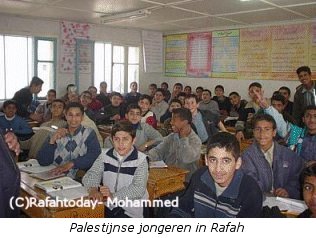 Ik heb altijd in “Block O” gewoond, in het vluchtelingenkamp langs de grens met Egypte. Een jaar geleden is ons huis vernield. Ik was op de universiteit in Gaza. Toen ik terugkwam werd me verteld dat ons huis was vernield. De bulldozers waren bezig. Nu wonen we in Haj as-Salam, een andere wijk, we moeten daar een flat huren. Weet je, ze zeggen dat het om de tunnels gaat, maar hoeveel hebben ze er nu eigenlijk gevonden. Weegt al dat leed op tegen die paar tunnels?
Wij noemen de muur: Jeddaar al-Fasl w’al-‘Unsary, de afscheidings- en apartheidsmuur. Ze willen ons gewoonweg niet, dat we niet bestaan. De vraag of de muur een oplossing dichterbij brengt vind ik eigenlijk irritant. Iedereen heeft het de hele tijd maar over oplossingen, maar een oplossing waarvoor en wat voor oplossing? OK: laat ze de muur weghalen, laat ze hem vernietigen, laat ze de controleposten weghalen en de nederzettingen ontruimen. Dat zou een hoop schelen.
Ik heb altijd in “Block O” gewoond, in het vluchtelingenkamp langs de grens met Egypte. Een jaar geleden is ons huis vernield. Ik was op de universiteit in Gaza. Toen ik terugkwam werd me verteld dat ons huis was vernield. De bulldozers waren bezig. Nu wonen we in Haj as-Salam, een andere wijk, we moeten daar een flat huren. Weet je, ze zeggen dat het om de tunnels gaat, maar hoeveel hebben ze er nu eigenlijk gevonden. Weegt al dat leed op tegen die paar tunnels?
Wij noemen de muur: Jeddaar al-Fasl w’al-‘Unsary, de afscheidings- en apartheidsmuur. Ze willen ons gewoonweg niet, dat we niet bestaan. De vraag of de muur een oplossing dichterbij brengt vind ik eigenlijk irritant. Iedereen heeft het de hele tijd maar over oplossingen, maar een oplossing waarvoor en wat voor oplossing? OK: laat ze de muur weghalen, laat ze hem vernietigen, laat ze de controleposten weghalen en de nederzettingen ontruimen. Dat zou een hoop schelen.
|